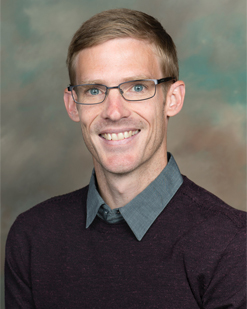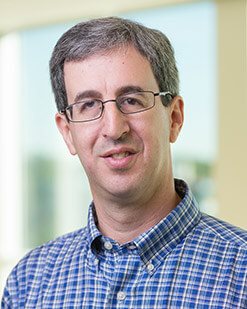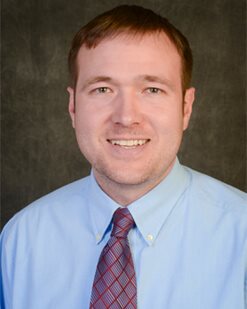Our faculty, researchers and staff are dedicated to understanding the genetics of complex lung and immune-related conditions common in patients cared for at National Jewish Health and the University of Colorado Denver.
Tasha E. Fingerlin, PhD
Associate Professor
Department of Biomedical Research
Director, Center for Genes, Environment and Health
Director, Program in Quantitative Genetics
Education:
Concordia College, Seward, Nebraska, BS, Secondary Education (Mathematics and Biology), 1997
University of Michigan, MS, Biostatistics, 1999
University of Michigan, PhD, Epidemiology, 2003
Background:
Dr. Fingerlin's research interests include, Genetic Epidemiology, Type 1 & Type II Diabetes, Chronic Beryllium Disease, Schizophrenia and Statistical Methods.
Scott Alper, PhD
Associate Professor
Education:
Harvard University, PhD, 1996
Background:
Diseases of the immune system such as sepsis, asthma, and atherosclerosis affect millions of people worldwide, and the incidence of many of these diseases is rising. Dr. Alper's lab is focused on understanding the regulation of the innate immune response, particularly as it relates to the basis for such immunological diseases. He is using a comparative genomics approach in the nematode C. elegans and mammalian cell culture to identify novel regulators of the innate immune response, and testing the effect of these regulators in mammalian disease models.
Sonia M. Leach, PhD
Director of Bioinformatics, Assistant Professor
Education:
Bucknell University, BS, Computer Science and Engineering
Brown University, ScM, Computer Science
Brown University, PhD, Computer Science
University of Colorado Denver, Postdoctoral, Computational Pharmacology Group
Katholieke Universiteit Leuven, Leuven Belgium, Postdoctoral, Bioinformatics Group
Background:
Dr. Leach's responsibilities at the Center for Genes, Environment and Health are to develop computational algorithms for the analysis and interpretation of genomic and proteomic datasets. She is particularly interested in methods which integrate diverse types of genomic data in order to explain high-throughput data results and prioritize those results for further follow-up studies. Dr. Leach is also an Assistant Professor in the Computational Bioscience Program at University of Colorado Denver.
Max Seibold, PhD
Assistant Professor
Education:
University of California-San Francisco, PhD, Pharmaceutical Sciences and Pharmacogenomics, 2008
Background:
The Seibold Lab is focused on identifying genetic determinants and biomarkers of complex lung diseases, including asthma and pulmonary fibrosis. Many of the genetic variants that influence development and severity of these lung diseases do so by altering molecular functions in specific lung cell types. His lab is focused on identifying dysregulated molecular functions in patient lung cells, by Nex-Generation sequencing technologies. Using patient cohorts the genetic determinants of these molecular changes are then mapped. The lab is also editing the genome of these lung cells to allow detailed mechanistic studies of disease variants and better understanding of how these genetic changes increase risk of disease development.
Michael Strong, PhD
Assistant Professor
Education:
University of California, Los Angeles, PhD
Harvard Medical School, Postdoctoral, Department of Genetics
Background:
The past decade has marked an exciting transformation in the biological sciences, from that of studying individual genes and pathways to instead studying entire genomes, proteomes, and metagenomic communities. As a result, Dr. Strong is very interested in developing synergistic genomic and computational strategies to better utilize, integrate, and analyze biological datasets from a systems biology perspective, incorporating elements of genetics, molecular biology, protein network analysis, and structure biology. Much of his work centers on respiratory diseases, including tuberculosis, and his goal as a researcher is to use modern genomic and computational methods to identify and investigate the molecular mechanisms of disease and to suggest more effective strategies to combat disease and drug resistance.

Brian Vestal, PhD
Assistant Professor
Education:
University of Colorado Denver, Denver, CO, PhD in Biostatistics
Californa State University Fullerton, Fullerton, CA, MA in Applied Mathematics
Vanguard University, Costa Mesa, CA, BS in Mathematics
Background:
Dr. Vestal has expertise in the analysis of genetic and genomic data, quantitative image analysis with applications in computed tomography and emphysema, Bayesian hierarchical modeling, and computational statistics.
Dr. Vestal has created a new Computed Tomography image analysis pipeline for use with Emphysema and COPD research called Emphysema PROfiler©. The new quantitative measures provided by Emphysema PROfiler©, are not available anywhere else and can enhance biomarker discovery and identification programs. Initial research results show these new measures have stronger associations with plasma protein expression and pulmonary function tests compared to current approaches, and can also provide improved disease tracking capabilities. The technology is supported by 3 publications and was created using COPDGene medical image repository. He has also partnered with Microsoft to make the analysis available to external researchers through a secure cloud-based system.

Camille M. Moore, PhD
- Associate Professor
Education:
Univeristy of Colorado Denver, Aurora, CO, PhD, Biostatistics
University of Colorado Denver, Aurora, CO, MS, Biostatistics
New York University, New York, NY, MA, Art History and the Conservation of Historic and Artistic Works
Cornell University, Ithaca, NY, BA, Chemistry & BA, Archaeology
Background:
Camille Moore, PhD is an associate professor in the Center for Genes, Environment and Health (CGEH) at National Jewish Health and also holds an appointment in the Department of Biostatistics and Informatics at the University of Colorado Anschutz Medical Campus, where she has taught several graduate level biostatistics courses including Advanced Data Analysis, Statistical Methods for Genetic Association Studies, and Statistical Methods in Genomics. Dr. Moore directs the CGEH Analysis Core, managing a group of 5 biostatisticians and bioinformaticians performing genetic, gene expression, epigenetic, and other ‘omics analyses.
Dr. Moore also oversees bioinformatic analysts in the Seibold and Janssen labs and serves as director of the Biostatistics, Bioinformatics and Environmental Sampling Core for the ENIGMA pediatric asthma cohort PPG. Dr. Moore’s research focuses on the development of statistical methods for analyzing bulk and single-cell RNA-sequencing data from longitudinal cohort studies and she has contributed to several RNA-seq analysis R packages. In addition, she has led the genetic analyses in a resequencing study of idiopathic pulmonary fibrosis and has expertise in gene expression network analyses to identify asthma endotypes. Dr. Moore currently serves as a co-investigator on several NIH grants exploring the relationships between bulk and single-cell RNA-sequencing gene expression data and respiratory diseases, including asthma, SARS-CoV-2, acute respiratory distress syndrome, and chronic beryllium disease.





